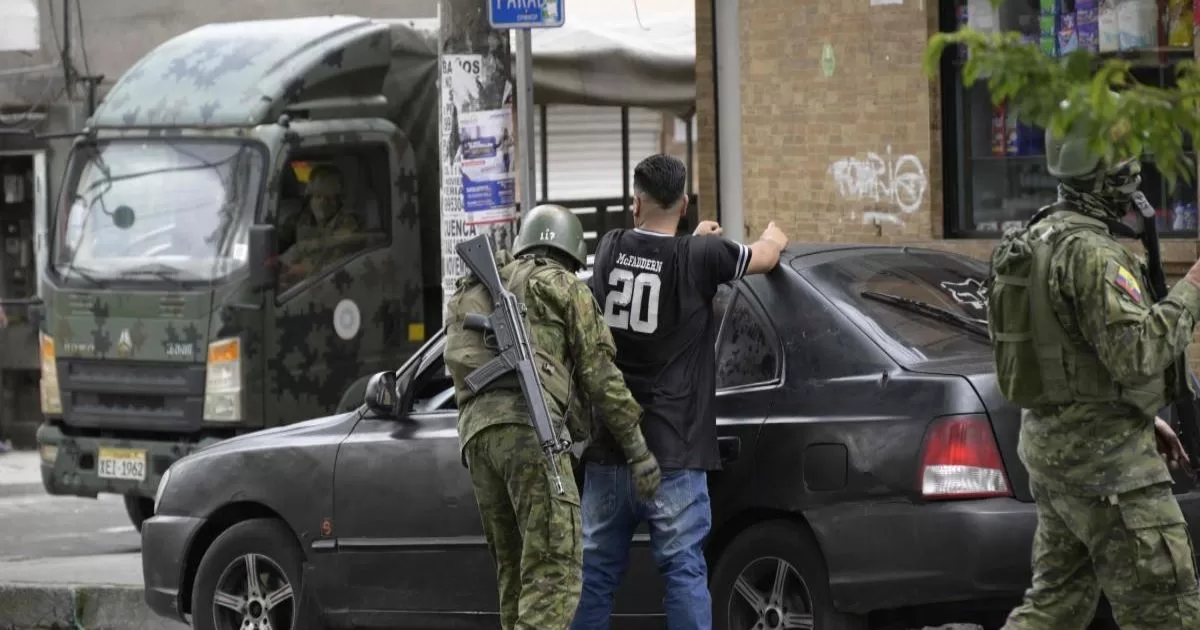MIAMI.- The 2024 ranking of the Center for International Studies of the Pontifical Catholic University of Chile (CEIUC) in its fourth edition of the Latin American Political Risk index, It is once again led by insecurity, organized crime and drug trafficking.
The increase in violence is an issue that has taken over the regional agenda and according to the Global Study on Homicide by the United Nations Office on Drugs and Crime (UNODC), organized crime is responsible for around half of the homicides in Latin America and the Caribbean: 8 out of 10 countries with the highest homicide rates on a global scale are located in this part of the world, the report states.
CEIUC: “Latin America is violent and criminal, but peaceful,” said academic César Niño to explain the reality of the region. “The continent does not present major threats of war, but it is increasingly besieged by violence, organized crime and drug trafficking, with a significant deterioration in recent years that has led it to become the region with the most homicides in the world” .
The combination of drug trafficking organizations, street gangs and militias deployed throughout the continent create an environment conducive to the escalation of violence, according to the United Nations.
Drug trafficking at record levels
Regarding drug trafficking and its relationship with organized crime, the record levels of cocaine production in Peru, Bolivia and Colombia have increased violence between local and international criminal groups in Ecuadorwhere homicides increased by 94.7% between 2021 and 2022, according to the UNODC, the report suggests.
Costa Rica is also experiencing an increase in homicides that reached a rate of 12.8 per 100,000 in 2022, according to the UNODC, mainly due to disputes between gangs dedicated to drug trafficking, in particular over control of the port of Moín, in the province of Limón. , a key center for the transportation of cocaine to Europe.
On the other hand, the report talks about the 2023 Global Peace Index report, which shows the most dangerous cities in the world with the increase in violence in urban areas driven by drug trafficking, route controls and clashes between cartels.
Among the cities with the greatest number of homicidesinclude Caracas (1 in the world ranking), San Pedro Sula (6), Rio de Janeiro (7), Salvador (8), Fortaleza (9), Recife (10), Tijuana (18), Lima (22), San Pablo (25), Mexico City (31), Bogotá (36), Buenos Aires (47), Quito (53) and Santiago (57).
The above is a reflection of the alarming increase in organized crime -often transnational- and insecurity in the region, which has risen exponentially in countries like Ecuador and others with high relative levels of security, such as Chile and Uruguay, the report adds.
Meanwhile, the authors of the document state that in Venezuela there are no large armed organizations, but there are large gangs; while in Colombia there are strong organized and armed groups, such as the National Liberation Army (ENL), the dissident groups of the FARC and El Clan del Golfo.
On the other hand, recognized organizations such as the Jalisco New Generation Cartel (CJNG) and the Pacific Cartel (Sinaloa) have expanded throughout the region, in addition to the fact that there are more and more medium and small groups with the capacity to traffic illicit goods without need. of belonging to a large organization, the document details.
According to the CEIUC, organized crime continues to grow where the State is relatively weak, corruption levels are high, and informal economies predominate with high rates of inequality and poverty. For their part, judicial systems without independence and public institutions with high rates of corruption contribute to an increasing perception of insecurity and impunity.
The ten risks identified, in order of importance, by the index are the following
- Insecurity, organized crime and drug trafficking
- Increase in corruption and impunity
- Democratic disaffection. Advancement of populism and authoritarianism
- Governance under pressure and rapid loss of support for leaders
- Increase in migratory flows
- Radicalization of social protests
- International instability
- Deterioration of the business climate
- Impact of technology on politics
- Vulnerability to climate change
Border control and uncertainty
On a political level, the report indicates that the vulnerability in the control of territorial borders and the low levels of judicial coordination have been facilitating the actions of illegal actors. In terms of political culture, it will be necessary to review incentive structures to modify social behavior that allow break the interwoven dynamics of acceptance and tolerance towards corruption.
When referring to the Venezuelan scenario It is indicated that after a decade of authoritarian government with Maduro in power, the sanctions of Western powers and the strategic coordination of the opposition have brought the regime to the negotiating table in the last months of 2023. It is anticipated that in 2024 they could presidential elections be held with certain guarantees and levels of integrity. María Corina Machado could be the candidate to confront Maduro, if the disqualifications are lifted. However, uncertainty is high and any detail can alter the course of events.
The report highlights a very important issue when it points out an alarming sign: more than half of Latin Americans are indifferent to the political regime, as long as the government solves their problems, giving more space to populist and authoritarian leadership.
In the region, only Uruguay, Costa Rica and Chile are full democracies, and Panama, Argentina, Brazil, Colombia and the Dominican Republic classify as incomplete democracies. Of the rest, eight countries are hybrid regimes (Peru, Paraguay, Ecuador, Mexico, Honduras, El Salvador, Bolivia and Guatemala) and 4 are authoritarian regimes (Haiti, Cuba, Nicaragua, Venezuela). Compared to the other regions analyzed in the index, Latin America presents the greatest democratic recession during the last two decades, highlights the CEIUC report.
Source: Report from the Center for International Studies of the Pontifical Catholic University of Chile

